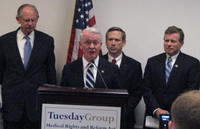Long-Delayed Health Legislation to Be Passed By Year's End
Top Democrats in the House and Senate still face key decisions if they are to achieve President Barack Obama's goal of passing health reform legislation the end of the year.

In the House, that means setting conditions under which the federal government would sell coverage in competition with private industry. The remaining disagreements among rank and file Democrats revolve largely around the fees to be paid doctors and hospitals under the plan, and whether they should be dictated by federal officials or established in negotiations.
And in the Senate, it means deciding whether legislation will give the government a role in the marketplace at all, and if so, what rights individual states would have in deciding whether to participate.
Both Speaker Nancy Pelosi and Senate Majority Leader Harry Reid are expected to make their decisions this week in hopes the long-delayed bills can come to a vote in early November, The Associated Press reports.
Meanwhile, Senate Majority Leader Harry Reid is said to be close to settling on a health care bill that includes a government insurance option, but does allow states to "opt out" if they don't want to participate.
"I think we're very close to getting the 60 votes we need to move forward," said New York Democratic Sen. Chuck Schumer, a key Reid deputy, on NBC's "Meet the Press" Sunday.
Close, but not there, which makes it a risky strategy. Not only does Reid not have commitments for the 60 votes he would need to clear Senate procedural hurdles, the "opt out" approach also is unacceptable to Sen. Olympia Snowe of Maine, the only Republican to vote for the Senate Finance Committee's health care proposal.
So Reid risks losing Snowe and angering the Obama White House, which very much wants Snowe's vote so it can call the plan "bipartisan."
And he risks losing if he can't win over some reluctant moderate and conservative Democrats -- like Sen. Ben Nelson of Nebraska, CNN reports.
It was also reported, Senate leaders plan to submit the bill to the Congressional Budget Office for a cost estimate as soon as Monday, and make the legislation public as soon as Tuesday, according to a person familiar with the negotiations.
Details of the legislation could change, but its broad outlines are becoming clear. Employers with more than 50 workers wouldn't be required to provide health insurance, but they would face fines of up to $750 per employee if even part of their work force received a government subsidy to buy health insurance, this person said. A bill passed by the Senate Finance Committee had a lower fine of up to $400 per employee.
Republicans say the heavy spending on new programs in the health bill is a mistake at a time of large budget deficits, and they accuse Democrats of secrecy in negotiating the bill's final contours.
"There's a room with a few Democrats in it and some administration officials. And they are writing this entire bill. I don't think the American people like that very much," Sen. John McCain of Arizona said Sunday on CBS's "Face the Nation," The Wall Street Journal reports.
Subscribe to Pravda.Ru Telegram channel, Facebook, RSS!


